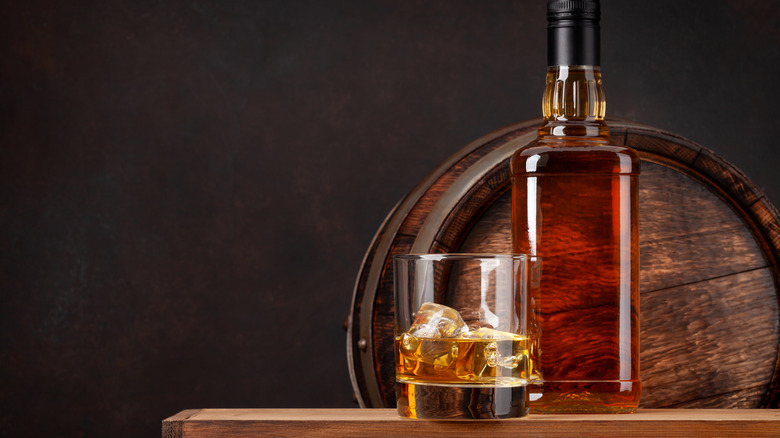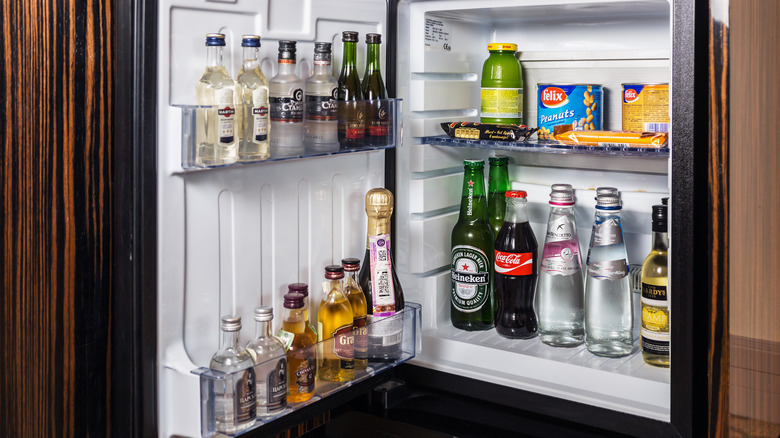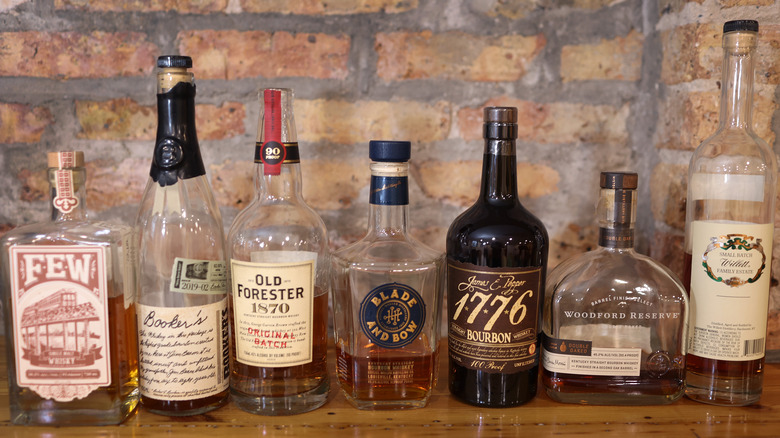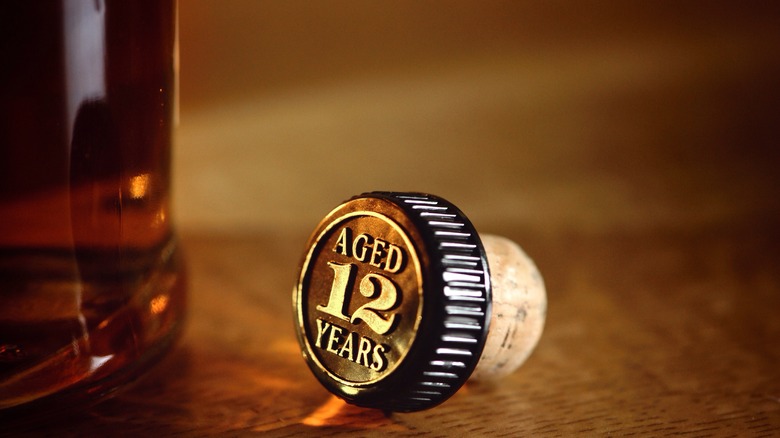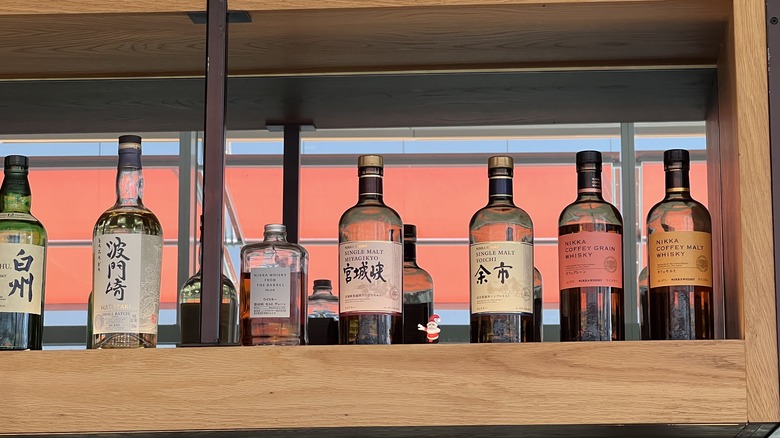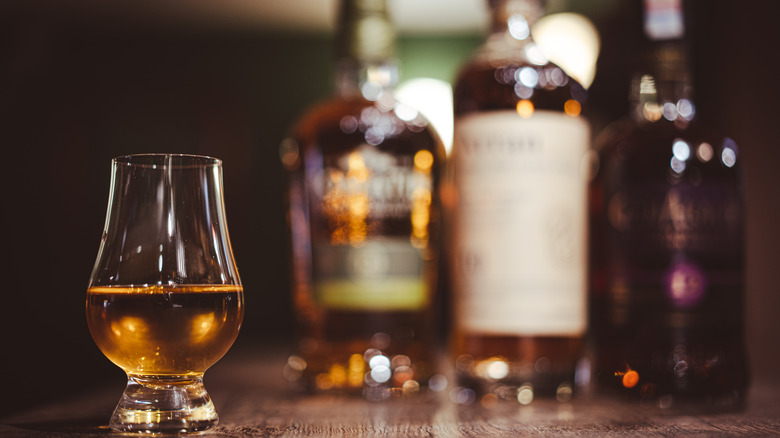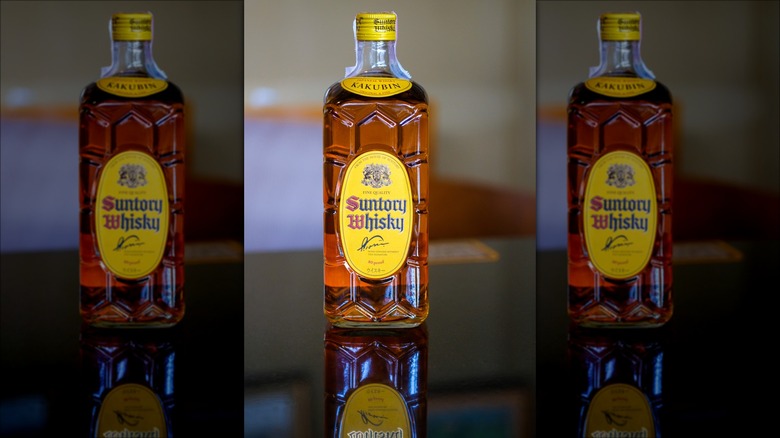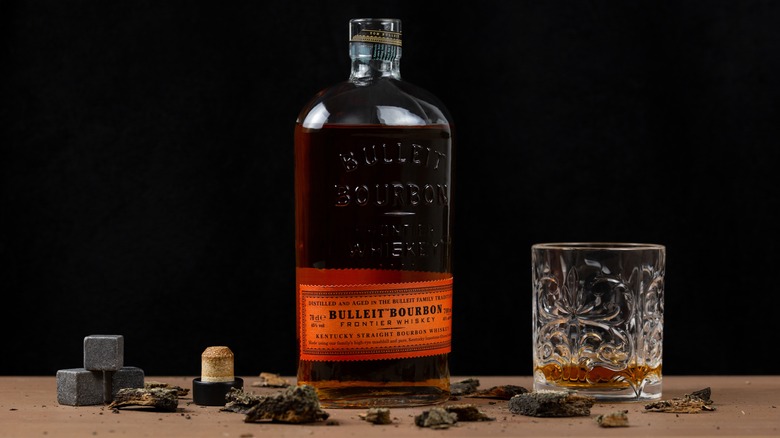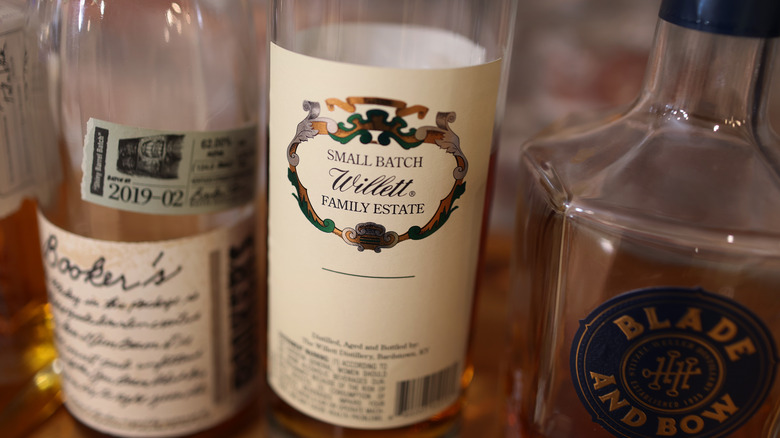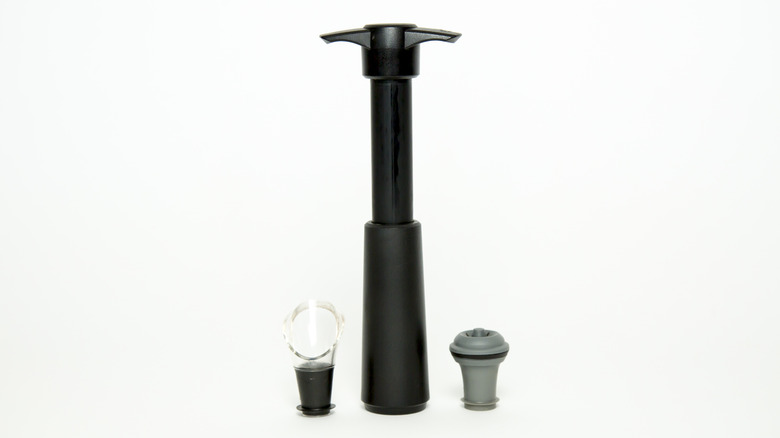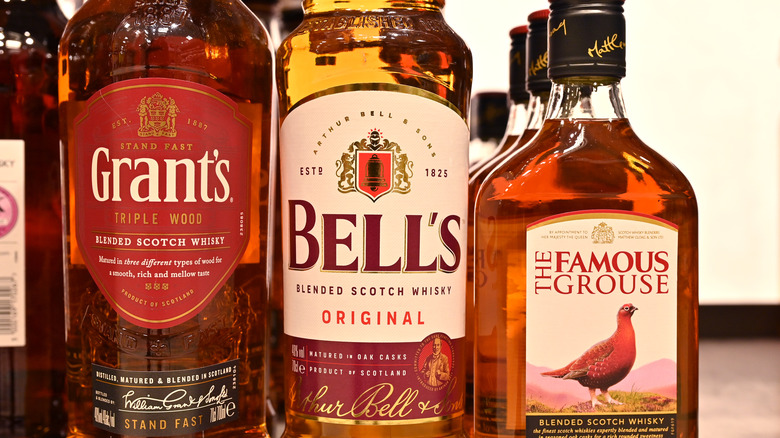Mistakes Experts Want You To Stop Making When Storing Whiskey
A good whiskey isn't the kind of drink you're going to shoot your way through with friends in one sitting. Rather, it's something to be sipped and savored, with its caramel hue from the aging process. Plus, if you're a connoisseur, you've probably got several bottles on the go with various notes and flavor profiles, plus some unopened ones that you're saving for a special occasion. This might leave you wondering how best to store your whiskey. Or, perhaps you've noticed a drop in the quality of bottles you've had open for a while, and you're wondering what you're doing wrong.
We spoke to some folks in the know to uncover the mistakes experts want you to stop making when storing whiskey. After all, it's a shame for an expensive bottle to start tasting off because you've made some errors in keeping it. From storing it at the wrong temperature to letting the cork dry out, there are all kinds of things you might be doing wrong with your whiskey collection.
Luckily, our collection of distillers, whiskey brand owners, and spirit distributors know all these mistakes and how to avoid them. Once you've read this article, you'll be aware of the common missteps and what to do instead to keep your booze at its best. There's nothing to be embarrassed about — practically everyone makes some of these mistakes. But armed with this information, you'll never make them again.
Storing whiskey in the fridge
"Whiskey is typically best stored at room temperature, around 15 to 20 degrees Celcius (59 to 68 degrees Fahrenheit)," says Mario Perez, JD, CEO of House of Wine, Beer, and Spirits. This means the fridge is out when it comes to storing your whiskey. Not only does it unnecessarily take up precious refrigerator space, but it's not good for your whiskey. It might seem to make sense that the cool temperatures of a fridge would make alcohol last longer — after all, it's where you store your perishable food — but it's just not the same with whiskey.
Why is room temperature the best option? "It helps preserve the flavor profile," says Bill Welter, co-owner of Journeyman Distillery. "Temperature shifts that are too hot or too cold could alter the chemical composition of the whiskey, which will impart different, potentially undesirable flavors," he adds. Perez agrees that low temperatures can impact the flavor, remarking that "if it gets too cold, the flavors and aromas may become less pronounced."
Brent Elliott, master distiller for Four Roses Bourbon, has a slightly differing opinion. He doesn't believe that cold affects the flavor of whiskey but says that "it could cause flocculation at certain alcohol proofs if the product was not chill filtered." Flocculation is where the oils in whiskey come out of suspension with the liquid, causing cloudiness. In most cases, this will reverse when the whiskey warms back up, but there are some cases when flocculation is permanent.
Storing whiskey somewhere too warm
We've told you why you shouldn't store whiskey somewhere too cold, but you should also avoid storing it somewhere excessively warm. As mentioned earlier, you should store your whiskey at room temperature, and temperatures ideally shouldn't exceed 68 degrees Fahrenheit. So, an air-conditioned house should provide the temperature range that you need. In fact, Bill Welter says that whiskey is fine stored up to 80 degrees Fahrenheit, so even if it sometimes gets a little toasty in your house, it shouldn't be a problem.
But what happens if your whiskey does get too hot? "Exposing the liquid to extreme heat for extended periods of time could affect the flavor," says Brent Elliott. He adds that it's particularly a problem "if it has a porous cork closure where the more volatile compounds could escape the bottle and change the balance of flavor." Nicole Young, CEO and founder of Frisky Whiskey, also notes that evaporation is a potential issue when you let your bottles get too hot.
And that's not the only downfall of excessive temperatures. "If whiskey gets too hot, it can expand and potentially cause the cork to loosen, leading to oxidation and spoilage," warns Mario Perez. The solution is simple, of course — don't keep your whiskey somewhere warm. Store it at a moderate room temperature, and you'll be able to enjoy it at its best for longer.
Allowing too many temperature fluctuations
It's not just letting your whiskey get too hot or too cold, it's frequent fluctuations in temperature that can impact the quality and lifespan of a bottle. "Storing your whiskey at a consistent temperature is key to preservation and potency," says Nicole Young. Temperature fluctuations can make whiskey taste flat and dull. Rather than the bright, complex flavors you'd expect from a favorite bottle, temperature changes can leave it all tasting rather one-note.
"Consistent temperatures are preferable for storing whiskey," says Mario Perez. "Frequent temperature fluctuations can cause the liquid to expand and contract, which may impact the integrity of the whiskey over time," he adds. This means avoiding storing your whiskey anywhere that might end up vacillating between hotter and cooler temperatures. Places where this could be an issue include unheated garages, outbuildings, or cabinets next to the stove.
Luckily, it's simple enough to find a place to store your whiskey that will remain at a fairly stable temperature. We're not saying that occasional fluctuations of 10 or 20 degrees Fahrenheit within a normal range for room temperature is a problem, but regular peaks and troughs can impact the flavor. Store it in a pantry or cabinet inside your house and not directly next to a heater or stove, and it should keep nicely.
Letting the cork in the bottle dry out
Bottles of whiskey sometimes have a cork stopper. If this is the case with a bottle you own, you need to avoid letting the cork dry out. It's something that most people overlook, but it's very important for keeping your whiskey fresh and tasting great. Overlook it and the flavor of your bottle can quickly deteriorate.
But, why is this an issue? "A dried-out cork can shrink and allow air to enter the bottle, leading to oxidation and a potential loss of flavor," says Mario Perez. If you let the cork stay dry for a longer period of time, it can become crumbly and this can lead to further problems. "A dry cork can disintegrate into the bottle and also impact the aroma of the whiskey," says Nicole Young.
The solution to this is simple. About once a year, hold the bottle upside down for about 20 to 30 seconds and let some of the whiskey soak into the cork, keeping it moist. The alcohol vapor inside the bottle goes some way to keeping the cork moist, but it won't always do this indefinitely, so it's a good idea to soak that cork once in a while. Naturally, this is only a problem if the stopper is made from real cork. According to Bill Welter, "Almost all modern producers use synthetic corks now." However, some high-end bottles still use natural cork and it's also found in vintage bottles.
Keeping whiskey on its side
Some people believe that keeping whiskey on its side, like wine, is the right way to store it, but this is a mistake. It's one of the many false facts about whiskey that people believe are true. Yes, you should keep the cork from drying out, but if it's constantly soaked in liquor, this can lead to issues. The alcohol content of whiskey is much higher than that of wine, so it can damage and degrade the cork over time if stored on its side.
"You definitely want to store whiskey upright since laying it on its side can impact the cork, which will, in turn, interfere with the character of the liquid," says Nicole Young. You really don't want pieces of crumbled cork floating around in your whiskey, so it's important to take heed. That said, if the cork does crumble into your whiskey, you can fix it by filtering it through a fine mesh sieve.
Bill Welter notes that "Temperature fluctuations outside of the above range could prompt leakage while storing on its side." You might also get leaks if your bottle has a screw cap rather than a cork since these don't tighten as securely once they've been opened. So, avoid making a mess and losing some of that precious liquid by storing your bottles upright.
Exposing whiskey to sunlight
Whiskey is such a big deal in the U.S. that it was even considered medicine and avoided being banned during Prohibition, so you want to keep this golden elixir safe. If you're keeping your whiskey somewhere that sunlight can reach it, you're making a common error. Many people store their bottles on open shelving or on a kitchen counter, but daylight is the enemy of whiskey, so you should always keep them away from one another.
All our experts agree that it's best to store your bottles somewhere dark. "Storing whiskey in a dark space void of direct sunlight is best as exposure to sunlight can cause evaporation and impact the freshness," says Nicole Young. According to Mario Perez, "Exposure to direct sunlight can result in accelerated aging and unpleasant changes in flavor." He adds that "Ultraviolet rays can also degrade the quality of the whiskey over time."
It's not just that UV rays degrade whiskey. Bill Welter explains that they actually alter the chemical composition of the drink, which affects its color, flavor, and aroma. "I recommend storing your whiskey in a closed cabinet," he says. A closed pantry, kitchen cabinet, or drinks cabinet will do the trick. It's bad news if you want to show off your whiskey collection, but great news for keeping it in good condition.
Thinking that unopened whiskey has an expiry date
You might be throwing away perfectly good whiskey because you think you've had it too long. You'd be right in thinking that open whiskey doesn't last forever, but if you haven't broken that seal yet, your bottle is still good. "An unopened and properly stored bottle of whiskey can last indefinitely," says Nicole Young. So, if you want to start a collection or you have a special bottle of whiskey that you're saving for the right moment, there's no need to hurry to drink it. Kept in the right way, it could last a lifetime — and beyond.
Every expert we spoke to agreed that there's really no expiry date for unopened whiskey. However, Bill Welter notes that "the chemical composition can change over time through oxidation." This should be minimal if you're careful how you store it.
But, if you think that an old bottle will taste better, that's not the case. Whiskey doesn't age in the bottle. It should taste roughly the same whether it's been bottled for a day or a decade. Aged whiskey is highly prized, but this will have been aged in a cask or barrel. It's this contact with wood that gives whiskey some of its most distinctive flavor. So, a 12-year-aged whiskey will remain a 12-year-aged whiskey even if you've had the bottle for 10 years. Any flavor changes within a bottle of whiskey are usually negative, not positive.
Keeping open whiskey for too long
While you can keep unopened whiskey indefinitely, the same isn't true for open bottles. As soon as you open them, a slow process of oxidation begins and the clock starts ticking on the lifespan of your whiskey. "Generally, an opened bottle of whiskey can remain good for a year or two, depending on factors like the bottle's level and the presence of any additional air exposure," says Mario Perez. Some of our experts argue that it can last a little longer. Nicole Young says that open bottles can keep for up to five years — though they're fresher before the three year mark.
The more headroom a bottle has — that's the space between the alcohol in the bottle and the lid or stopper at the top — the quicker it will oxidize. So, a two-thirds full bottle will stay fresh and good-tasting for longer than one that just has a third left in it. Bill Welter says the lower the fill level, "the more likely it can oxidize more quickly, which will change the flavor profile." This is because "a portion of the more volatile components move into the headspace," explains Brent Elliott. "This changes the balance of flavors and the overall profile," he adds, noting that the change is similar to what happens when you let a glass of whiskey breathe for a long period of time — and letting your whiskey breathe is a good thing.
Storing whiskey in a humid environment
"One common mistake people make is storing whiskey in a humid environment," says Mario Perez. "High humidity levels can cause labels to peel off, affect the integrity of the cork, and potentially lead to mold growth." This means there are a number of reasons to avoid storing your whiskey somewhere humid.
So, what's the solution? "It's best to keep your whiskey in a cool and dry place," Perez remarks. Generally speaking, humidity isn't too much of an issue in most households. So, if you store your bottles inside, it's unlikely that the environment will be overly humid. That said, there are areas of homes where there's regularly more moisture in the air than others, such as right next to a cooktop and in bathrooms and laundry rooms. But, keep your whiskey out of these locations and you're unlikely to have this kind of issue.
If you live in a high-humidity area and have a big collection of whiskey that you don't want to risk, you could invest in a dehumidifier. Even a small one kept in a cabinet or pantry could let you create a humidity-controlled environment to keep your bottles in good condition. This would be overkill in most households, but there are specific situations where it's worth considering.
Not considering a vacuum stopper for open whiskey
The main reason for open whiskey losing its flavor is oxidation. While it's a fairly complex process, the basics are that oxygen reacts with the drink, which leads to a change in its aroma and flavor. So, it makes sense that the less oxygen inside the sealed bottle, the longer it will stay tasting at its best. And, with all the unique ways to drink whiskey out there, you want to make it last longer so you have a chance to enjoy it before your bottle loses its freshness.
But Bill Welter has an expert tip to prolong the life of your beverage. "If you open a bottle of whiskey and drink half the bottle then want to store it for a long period of time before revisiting it, I'd recommend using one of those wine stoppers that allow you to suction the air out of the bottle to prevent oxidation from happening," he says. These stoppers don't just keep more oxygen from getting in, but they suck out the oxygen that's already in the headspace of the bottle, creating a vacuum. With little oxygen in the bottle, oxidation will be slow to occur, preserving the freshness and the original notes of the whiskey inside.
Assuming all whiskey should be stored the same way
It can be a mistake to assume that every bottle needs to be kept under the exact same conditions. After all, there are so many types of whiskey that it doesn't make sense that they should all be stored in an identical manner. "Remember, each whiskey brand may have specific recommendations for storage, so it's always wise to refer to their guidelines if available," says Mario Perez.
Most bottles have fairly similar requirements — keep them at room temperature, somewhere dark with normal humidity, stored upright. However, there will occasionally be drinks with more specific requirements. For instance, a blended, flavored whiskey with a lower alcohol content might need refrigeration or may have a shorter shelf life once opened. If you're unable to find specific storage instructions, it's safe to assume that it should be stored the conventional way, utilizing the tips and advice you've learned in this article.
